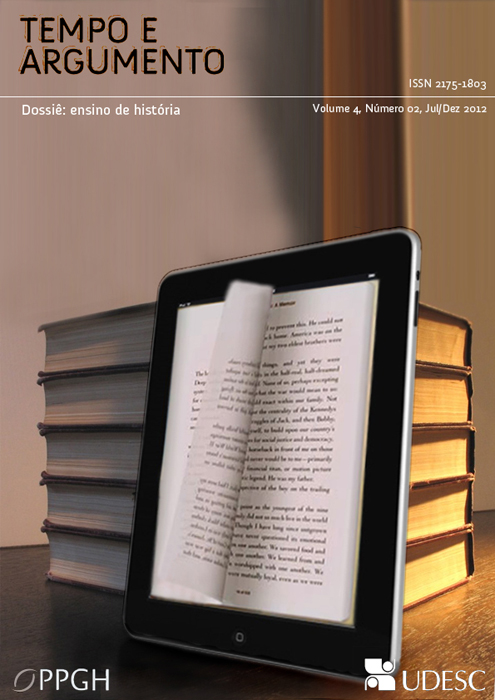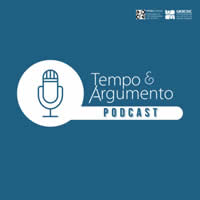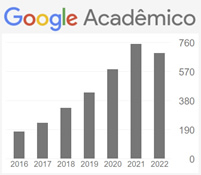A campanha presidencial televisiva de Lula em 2006 revista desde a didática da história
DOI :
https://doi.org/10.5965/2175180304022012004Mots-clés :
televisão, propaganda, propaganda política, consciência históricaRésumé
Discute-se o papel da propaganda política televisiva no processo de ensino e aprendizagem de História, através dos processos de resgate e reforço de símbolos e ideias referentes às representações identitárias e história político-social do Brasil, mobilizadas para a construção de projetos de poder. Trata-se, portanto, de um estudo que pretende contribuir para o conhecimento das relações entre os aspectos formais/escolares e os aspectos não-formais/ extra-escolares do ensino e aprendizagem da História. Parte-se do referencial teórico da Didática da História, que tem na consciência histórica o seu conceito principal (cf. J. Rüsen, K. Jeissman, P. Seixas e outros). A metodologia consiste, além dos instrumentais de análise das mensagens televisivas (sobretudo R. Barthes), na identificação e análise das narrativas e /ou "histórias ultracurtas" presentes no discurso político, capazes de ativar elementos do imaginário e da memória coletiva a serviço de fins imediatos. A conclusão preliminar é a circularidade entre o ensino - aprendizado escolar e as mensagens midiáticas, contribuindo para a compreensão da interdependência e jogos de dominação entre essas esferas.
Téléchargements
Références
BAPTISTELLA, Ester C ecilia Fernandes. A compreensão do conteúdo de um comercial televisivo na infância. Campinas, SP: Dissertação de Mestrado FE – Unicamp, 2001.
BARTHES, Roland. Societé, imagination, publicité. In: BARTHES, Roland. Oeuvres completes. Paris: Seuil, 1994. p. 507-517. BELINTANE, Claudemir. A escola e a lan-house. São Paulo: Mimeo, 2006.
BERGMANN, Klaus. A história na reflexão didática. São Paulo. Revista Brasileira de História, v.9, n. 19, p. 29 – 42, set. 89/fev. 90.
BURTON, Graeme. Talking television: an introduction to the study of television. London: Hodder Arnold H&S, 2000.
CERRI, Luis, Fernando. 1972: Sete bandeiras do setecentenário por mil cruzeiros velhos. Estudos Ibero-Americanos. , v.XXV, p.193 - 208, 1999.
CERRI, Luis, Fernando. Didacticas publicas de la Historia: demandas sociais, políticas de Estado e usos da História no Brasil contemporâneo. In: Actas de las Xas Jornadas Interescuelas Departamentos de Historia. Rosario, Argentina: Escuela de Historia -Universidad Nacional de Rosario, 2005.
CERRI, Luis, Fernando. Usos públicos da história no Brasil contemporâneo: demandas sociais e políticas de Estado. Araucaria, Sevilha, Espanha, v. 8, n. 15, p. 1-15, 2006.
DA MATTA, Roberto. Carnavais, malandros e heróis: para uma sociologia do dilema brasileiro. Rio de Janeiro: Rocco, 1997.
FERNANDES, Florestan. O negro no mundo dos brancos. São Paulo: DIFEL, 1971.
FUENZALIDA, Valerio. La política resignificada desde la televisión. Diálogo Político. Buenos Aires, v. 4, n. 1, p. 47 - 66, 2004.
FICO, Carlos. Reinventando o Otimismo: ditadura, propaganda e imaginário social no Brasil. Rio de Janeiro: Fundação Getúlio Vargas, 1997.
LAVILLE, Christian. Historical consciousness and Historical Education: what to Expect from the First to the Second. In: SEIXAS, Peter (ed.). Theorizing Historical Consciousness. Toronto: University of Toronto Press, 2004, p. 165 - 182.
LIMA, Venício A rtur de. A mídia nas eleições de 2006. São Paulo: Fundação Perseu Abramo, 2007.
ORTIZ, Renato. Cultura Brasileira e Identidade Nacional. São Paulo: Brasiliense, 1985.
RAMALDES, Dalva; REIS, Ruth. Discursos e deslocamentos de Lula: estratégias da propaganda eleitoral da eleição à reeleição. In: CONGRESSO ANUAL DA ASSOCIAÇÃO BRASILEIRA DE PESQUISADORES DE COMUNICAÇÃO E POLÍTICA, 1, 2006, Salvador, BA. Anais eletrônicos... Belo Horizonte: UFMG. Disponível em: <http://www.fafich.ufmg.br/compolitica/anais2006/Ramaldes_e_Reis_2006.pdf>. Acesso em: 28 set. 2010. RUBIM, A. A. C. Cultura e política na eleição de 2002: As estratégias de Lula presidente. Brasília: Mimeo, 2003. Disponível em: < http://e-groups.unb.br/fac/comunicacaoepolitica/Albino.pdf>. Acesso em: 20 set. 2010.
RÜSEN, J. What is Historical Consciousness? - A Theoretical Approach to Empirical Evidence. In: CANADIAN HISTORICAL CONSCIOUSNESS IN AN INTERNATIONAL CONTEXT: THEORETICAL FRAMEWORKS, 2001, Vancouver. Paper... Vancouver: University of British Columbia, 2001.
WEST, D. M. Television Advertising in Election Campaigns. Political Science Quarterly. V. 109, [New York], n. 5. pp. 789-809, 1994-1995.
Téléchargements
Publiée
Comment citer
Numéro
Rubrique
Licence
(c) Tous droits réservés Tempo e Argumento 2012

Ce travail est disponible sous licence Creative Commons Attribution - Pas d’Utilisation Commerciale 4.0 International.
Os artigos cujos autores são identificados representam a expressão do ponto de vista de seus autores e não a posição oficial da Tempo e Argumento.





